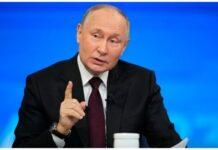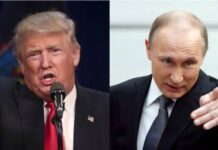
Over the past seven months, Nigeria has seen its economy spiral downwards as inflation runs rampant and the surging price of everyday commodities puts ever more strain on households. This is not a uniquely Nigerian problem; the global economy is in crisis. But in Nigeria, pre-existing levels of poverty mean that the pain is felt particularly keenly.
The causes of the current crisis are complex, but the critical role of Russia in this financial emergency cannot be underestimated, which, through its illegal invasion of Ukraine, has been wilfully trying to disrupt the global trade and weaponizing its food and energy supplies to blackmail the world. Russian propaganda tries to point the finger at international sanctions, but this is a gross distortion of the facts and a flagrant attempt to obscure Russia’s responsibility for breaking the international economic system.
Let’s start with food. Immediately following its invasion, Russia blockaded Ukraine’s ports, mined its waters and deliberately bombed agricultural land – all to stop us exporting essential grain supplies to the world. Before the war, Ukraine was responsible for more than 10% of all grain exports in the world. Nigeria had year-on-year been increasing the amount of Ukrainian grain it imported, up from 81,000 tons in 2020/21 to 259,000 tons last season. The sudden severing of this supply chain has sent prices soaring and, with continued low global stocks of grains and moderate agricultural production outcomes in many of the world’s growing regions, there are no ready alternatives.
Ukraine is doing its best to unblock supplies. Farmers continue to work the fields even as Russian cluster bombs and rockets fall around them. Fifteen percent of the sector has been already destroyed. Agricultural workers have been killed harvesting the crops and farm machinery blown up. Then in late July Turkey and the UN moderated a so-called Grain deal between Ukraine and Russia that would allow grain exports to resume. But just a day later, Russian missiles targeted the Ukrainian port of Odesa, laying bear Putin’s perfidy and demonstrating his total lack of concern for the suffering of starving people around the world. Now, just two months later, exports from Ukraine via the sea are increasing substantially, but Russia continues its threats of pulling out of the deal altogether.
Russia’s deliberate weaponization of energy, turning off supplies to Europe has sent the oil and gas markets into turmoil. Nigeria, as an oil exporting nation, could in theory have benefited from the rising price of crude. But this has not come to pass. Because Nigeria lacks oil refining capabilities it is forced to import refined oil products, including petroleum, which have also spiked in price, cancelling out any net benefits. As Western countries reject Russian energy, there should be an opportunity for Nigeria to increase exports. However, the country is currently proving unable to increase production capacity sufficiently to meet demand and lacks the infrastructure to transport hugely increased quantities. Overall, the rise in oil prices has contributed to wider inflation across the Nigerian economy, supercharging the cost-of-living crisis.
And what of international sanctions? Well, first of all, these are a proportionate, moral and necessary response to Russia’s unprovoked and illegal invasion of a sovereign country and the ongoing, brutal war crimes committed by Russian forces.
Secondly, we must be clear that sanctions are not responsible for the disruption to food and energy markets, as Russian disinformation suggests. There are no sanctions aimed directly at food and fertilizer exports from Russia or Belarus. Fnancial transactions with Russia are still possible within the SWIFT system and with all companies involved in the value chain. The rise in prices and disruption of supplies are due solely to Russia’s chokehold on Ukrainian exports.
It’s the same with energy prices. There are no sanctions on oil and gas. The rocketing price of energy is due to Russia’s deliberate cutting off of supplies.
I am travelling to Nigeria in October to meet with leaders across politics, business and civil society to better understand how Russia’s war is impacting on your country and to start to explore ways that our two countries can work together to build a more prosperous future. There is a lot to build on. Ukraine and Nigeria already have strong trade partnerships, but there is potential for more. Across agriculture, mining and engineering sectors there are opportunities to share expertise and trade resources.
For centuries, African countries have been exploited by foreign powers, but Ukraine is not one of these and now there is a chance to build a new kind of partnership, one of equals. President Zelensky has underlined Ukraine’s commitment to Africa, calling for reform at the UN to better take into account African issues. The Speaker of the Ukrainian parliament, Ruslan Stefanchuk, has announced a new “Africa track” for more consistent engagement with African countries. I hope to help follow through on this commitment during my visit to Nigeria and start to build a strong and meaningful partnership between our countries.
Dr Nivievskyi is Vice President of Economic Education and an Associated Member at the Center for Food and Land Use Research at the Kyiv School of Economics.
Kindly contact us @ Naijalivetv@gmail.com
Call or Whatsapp: 07035262029, 07016666694, 08129340000










